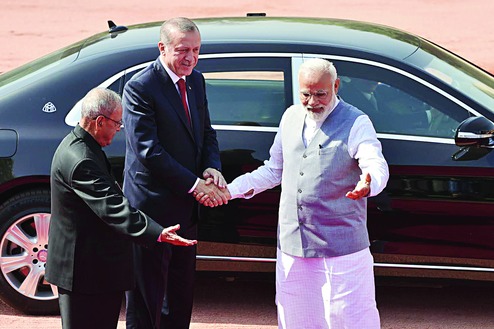
New Delhi, May 1: Prime Minister Narendra Modi on Monday used a firm handshake and optimistic words to portray ties with Turkish President Recep Tayyip Erdogan as filled with promise, but stark differences continued to hobble cautious efforts to smoothen a traditionally difficult relationship.
The two leaders, often compared for their "strong" control over power in their countries, did not confront each other over historic differences between the countries over Kashmir, where Turkey has long backed Pakistan's allegations of human rights abuses by Indian security forces.
Erdogan too steered clear of criticism of India over its refusal so far to act against followers of a popular cult led by cleric Fethullah Gulen, described by Turkey as a terrorist, in over two hours of talks with Modi here, officials from both countries said.
Turkey calls Gulen's cult - which has a presence in multiple countries, including India - the Fethullah Gulen Terrorist Organisation (FETO).
But neither Modi nor Erdogan made any progress in bridging differences between the countries on these issues, at the first strictly bilateral meeting between the two leaders, officials conceded.
Those differences spilled out in the form of divergent priorities even as Modi and Erdogan stood next to each other after their meeting, issuing prepared statements.
"We agreed that no intent or goal, no reason or rationale can validate terrorism," Modi said, suggesting Erdogan's support in India's criticism of Pakistan, which New Delhi accuses of sponsoring cross-border terrorism. "The nations of the world, therefore, need to work as one to disrupt the terrorist networks and their financing and put a stop to cross border movement of terrorists."
But the only specific attack in India that the Turkish President referred to, in his comments, was the April strike by Maoists against Indian paramilitary forces in Sukma, Chattisgarh, that left 25 soldiers dead. He did not refer to terrorist attacks in Kashmir.
Instead, he focused on the FETO and its presence in India, even as he appeared to suggest confidence that India would act against followers of Gulen - which Erdogan blamed for the failed coup attempt against him in 2015.
"I know India will take necessary measures to expel FETO from her territory, once and for all," Erdogan said.
Indian officials said they had given Erdogan no assurance of action against the FETO, unless New Delhi independently concludes that Gulen's followers have terror links.
"Any organisation in India, whether Indian or foreign, obviously has to adhere to the laws of our country," foreign ministry spokesperson Gopal Baglay said late evening, when asked about the Turkish demand.
Erdogan, whose visit to India marks the start of an international tour aimed at demonstrating global legitimacy after his victory in a controversial referendum that has tightened his grip on power in Ankara, emphasised the economic potential of the India-Turkey relationship.
The Turkish leader landed last evening with nearly 200 business leaders, and today morning inaugurated a meeting between them and Indian industry captains. The bilateral trade between the two countries at present stands at $6 billion annually, and Erdogan and Modi - who also attended the business meeting - pledged to try and raise the figure to $10 billion.
"President and I are clear that strengths of our two economies present an enormous opportunity to expand and deepen our cultural linkages," Modi said in the morning at the meeting between business leaders.
Later in the afternoon, Modi turned to the shared Indo-Turkish Sufi legacy of the 13th century poet Rumi to highlight historic ties.
But eight centuries after Rumi, the strategic relationship between the two countries remains deeply uncomfortable - so much so, that neither is averse to public signals of their differences even on the eve of a high-profile visit.
In the week before Erdogan flew into New Delhi, India hosted the President of Cyprus, and sent its Vice-President to Armenia. Turkey does not have diplomatic ties with Cyprus, with which it is locked in a territorial dispute, or Armenia, which holds the Ottoman Turkish empire responsible for mass massacres of Armenians.
And a day before he landed, Erdogan told a private Indian news channel that he would be willing to mediate between India and Pakistan on Kashmir, referring to Pakistan Prime Minister Nawaz Sharif as "my good friend."
India opposes any third party mediation over Kashmir, and insists that the spat be settled between New Delhi and Islamabad - a position Baglay iterated today when asked about Erdogan's comments.
Erdogan did not repeat the offer to mediate in his talks with Modi today, Baglay said.
But Baglay indicated India's challenge in convincing Turkey about its position on the Kashmir dispute - which Ankara views as a human rights challenge.
"We presented our views on terrorism and Kashmir to them - our case essentially was that the issue of Kashmir is fundamentally about terrorism," Baglay said. "Now we'll have to wait and see how they respond."










